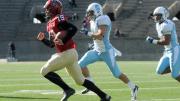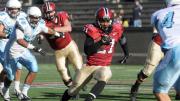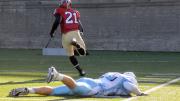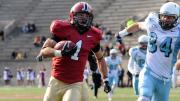How did Harvard ring up 69 points on Saturday? Let us count the ways.
Or should we? How much time do you have?
Ten different players scored in a 69-0 rout of Columbia, the Crimson’s most lopsided win over an Ivy rival since a 77-0 trampling of Cornell in 1890. Colton Chapple, Harvard’s masterly quarterback, accounted for four touchdowns, three in the air and one on foot. Columbia turnovers yielded another 28 points. The last two touchdowns of the game came on dramatic breakaway runs by reserve tailback Damani Wilson.
Head coach Tim Murphy described the crushing victory as “a perfect storm of offense, defense, and special teams.” The Crimson offense outgained the Lions, 585-149, while the defense recorded eight quarterback sacks, recovered three fumbles, and intercepted three passes, returning one for a touchdown. Columbia running back Marcorus Garrett, who entered the game as the Ivy League’s third-ranking rusher, was held to 28 yards on seven carries.
Chapple, who played only two quarters, completed 14 of 19 passes for 204 yards. The senior quarterback’s three scoring passes brought his league-leading total to 21, breaking the Harvard single-season record of 18 set by Neil Rose ’03 in 2000.
“We’ve had guys that have looked better in uniform, guys that maybe can bench-press more,” said coach Murphy after the game. “But you put [Chapple] in a game, wow. It’s amazing how he can just get everything to play in slow motion—just seemingly doing all the right things, all the time.”
The first three scores of the day came on highlight-reel catches by receivers Ricky Zorn ’14, Andrew Berg ’14, and Kyle Juszczyk ’13. Harvard put the game away with 35 points in the second quarter, scoring three times in a span of 45 seconds. Two of those quick scores resulted from consecutive interceptions by linebacker Connor Loftus ’14 and safety Chris Splinter ’14.
With Conner Hempel ’15 and freshman Scott Hosch ’16 getting some work in at quarterback, the Crimson reserves continued the scoring tattoo in the second half.
Short-yardage touchdowns by backup tailbacks Paul Stanton Jr. ’16 and Rich Zajeski ’13 upped the lead to 55-0 in the third period. The Crimson offense kept the ball on the ground for the last 20 minutes of play, but could not keep tailback Damani Wilson ’14 from running wild. A track and field standout who holds the Ivy League record in the 60-meter dash, Wilson was fourth on the depth chart at his position and had previously seen limited action, mostly on special teams. On the field for just two Crimson ground drives, he broke loose for long-distance touchdown runs of 45 and 43 yards, finishing as the game's top ground-gainer with 121 yards rushing.
In addition to Chapple’s seasonal passing record, the runaway victory produced a few more Harvard firsts.
Those 35 second-period points broke the modern record for scoring in a single quarter. The old record was 29, set in a 57-0 shutout of Columbia in 1973.
The overall point total was the highest for a modern-era Crimson team since a 69-0 win over the Coast Guard Academy in October 1946.
With nine points-after, kicking specialist David Mothander ’14 raised his Harvard career record for PATs to 127. The previous record of 92 was established by Matt Schindel ’08.
The final score was the most lopsided in 56 years of round-robin Ivy League play.
Harvard (7-1, 4-1 Ivy) and Pennsylvania (4-4, 4-1) are now tied for the league lead. A last-ditch Penn victory over Princeton on Saturday effectively knocked the Tigers out of contention and made it a two-team race for the championship. Harvard can clinch at least a share of the title by defeating Penn on the Quakers’ home grounds this weekend. It will be the eleventh time in 13 seasons that the two teams have met with the Ivy championship at stake.
Columbia (2-6, 1-4) had defeated Yale, 26-22, the previous weekend, breaking an 11-year run of losses to the Eli. Harvard has won 14 of the last 16 meetings with the Lions.
Elsewhere in the Ivies: In the game that mattered most to Harvard, a fourth-quarter rally gave Penn a 28-21 victory over Princeton (4-4, 3-2). Dartmouth (5-3, 3-2) walloped Cornell (4-4, 2-3), 44-28, and Brown (5-3, 2-3) shut out Yale (2-6, 1-4), 20-0.
Next Saturday: With the Ivy championship on the line, Harvard faces Penn at Franklin Field. The game kicks off at noon and will be aired by NBC Sports Network.
The Harvard-Columbia score by quarters:
Columbia 0 0 0 0 — 0
Harvard 7 35 13 14 — 69
Attendance: 5,838
The season so far:
Harvard 28, San Diego 13
Harvard 45, Brown 31
Harvard 52, Holy Cross 3
Harvard 45, Cornell 13
Harvard 35, Bucknell 7
Princeton 39, Harvard 34
Harvard 31, Dartmouth 14
Harvard 69, Columbia 0












